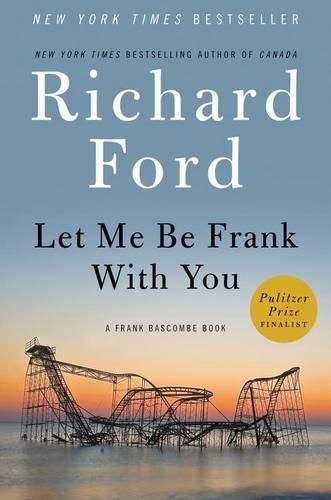Let Me Be Frank with You
Richard Ford

Let Me Be Frank with You
Richard Ford
A brilliant new work that returns Richard Ford to the hallowed territory that sealed his reputation as an American master: the world of Frank Bascombe, and the landscape of his celebrated novels The Sportswriter, the Pulitzer Prize and PEN/Faulkner winning Independence Day, and The Lay of the Land.
In his trio of world-acclaimed novels portraying the life of an entire American generation, Richard Ford has imagined one of the most indelible and widely discussed characters in modern literature, Frank Bascombe. Through Bascombe - protean, funny, profane, wise, often inappropriate - we’ve witnessed the aspirations, sorrows, longings, achievements and failings of an American life in the twilight of the twentieth century.
Now, in Let Me Be Frank with You, Ford reinvents Bascombe in the aftermath of Hurricane Sandy. In four richly luminous narratives, Bascombe (and Ford) attempts to reconcile, interpret and console a world undone by calamity. It is a moving and wondrous and extremely funny odyssey through the America we live in at this moment. Ford is here again working with the maturity and brilliance of a writer at the absolute height of his powers.
Review
Chris Somerville
One of Richard Ford’s greatest gifts to modern literature is Frank Bascombe. Frank’s dryly humorous voice first appeared in The Sportswriter, which is widely regarded as Ford’s breakthrough novel, both commercially and critically. Frank has reappeared three more times since then: in the Pulitzer prize-winning Independence Day, in The Lay of the Land and now, in the newly released Let Me Be Frank With You.
Set during the wake of Hurricane Sandy, Let Me Be Frank With You comprises four parts, linked thematically. In one story, Frank visits his former home which has been destroyed by the hurricane along with the man who he sold it to; in another he visits a friend on their deathbed. The plots act mostly as springboards for the unfolding of Frank’s thought process and early on he warns us, ‘[W]hat I mostly want to do is nothing I don’t want to do’. This stance of non-disruptiveness and observation weaves its way throughout the entire book. All of the wry humour that marked Frank’s appearances in earlier works is here, though now with a darker edge.
While these stories could easily be read independently of one another, when placed together the experience is enriching. For me, Let Me Be Frank With You feels like a meditation on the bemusement that comes with growing older. To Frank, it seems that death is everywhere and he thinks about it constantly, though his archness never allows his thinking to feel despairing: ‘‘‘What is it about falling?” he says. ‘“He died of a fall.’ ‘The poor thing never recovered after his fall.’ … In years gone by I’d fall on the ice, hop back up, and never think a thought. Now it’s a death sentence.”’
This item is not currently in-stock. It can be ordered online and is expected to ship in approx 4 weeks
Our stock data is updated periodically, and availability may change throughout the day for in-demand items. Please call the relevant shop for the most current stock information. Prices are subject to change without notice.
Sign in or become a Readings Member to add this title to a wishlist.


